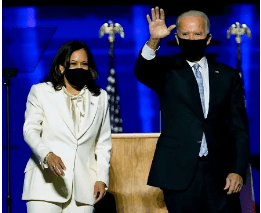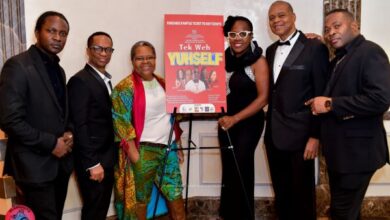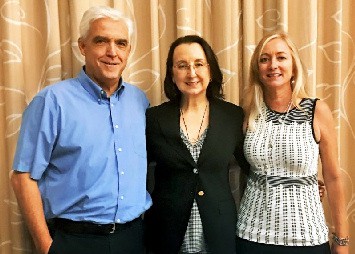Caribbean Nations Have High Hopes For the Biden-Harris Administration


By Wesley Kirton
[SOUTH FLORIDA] – As the Biden-Harris team takes office at the helm of the world’s most powerful democracy, the new Administration’s proposed foreign policy gives new hope to a turbulent world which over the past four years was confronted with American policy that was unpredictable, if not bizarre and which was often seemingly formulated and conducted by tweet and not tradition.
Perhaps nowhere is this new hope more pronounced at this time than in the Americas-the Caribbean and Latin America. Often neglected in the past by the United States unless a threat is posed to American interests especially by Russia and China, the Caribbean region looks forward to heightened and more meaningful engagement with the administration of President Joe Biden and Vice President Kamala Harris.
Both are no strangers to the Caribbean region especially the integration arrangement known as the Caribbean Community (CARICOM)-a string of nations from Suriname and Guyana which are geographically South American but culturally Caribbean through the islands of the Caribbean Sea that include Jamaica, Haiti and the Bahamas.
Vice President Harris
In fact, Vice President Harris will be a cultural icon in the new administration having the distinct honor of being the daughter of immigrant parents from Jamaica and India and the wife of a Jew. Add to that the honor of being the first woman to hold the office of Vice President, not only the Caribbean but the world at large expects that with these attributes she would bring a better sense of understanding, caring and compassion to the realities of the people of the Third World. No longer will these countries be considered ‘shithole’ countries.
The new administration, according to a senior adviser to its transition team, will be placing tremendous emphasis on global health, democracy and human rights, climate change and emerging technology, all of which are key concerns for the Caribbean region and its economies. With the Coronavirus (COVID-19) still “ wreaking havoc” throughout the world, it is no surprise that global health is a top priority of the new administration, from both the perspective of curbing the spread of the virus and the high rate of deaths, as well as the economic hardships is has brought on populations globally.
Tribute to COVID-19 Victims
As a first step having arrived in Washington, DC on Tuesday, one day ahead of his inauguration, President-elect Biden paid tribute to the 400,000 Americans who have died from COVID-19. This is indisputable testimony to the recognition of the pain and suffering the virus has brought to bear and the compassionate urgency which must occasion effective measures to deal with this pandemic.
Improved Relations with Guyana
“With the impending change in administration in the USA, Guyana looks forward to improved political and economic relations with the USA in addition to that between the Caribbean, CARICOM and the USA. The entire region needs more predictable and mutually beneficial policies on the part of USA,” says Carl Greenidge, former Vice President and Foreign Affairs Minister of Guyana. He is also currently his nation’s co-agent in a case now before the International Court of Justice (ICJ) based on a spurious Venezuela claim that the international award which legally established the boundaries between the two countries back in 1899, is not valid.
A Biden administration comes to office having to immediately confront a number of unprecedented domestic and foreign policy challenges many of which have critical impact on the Caribbean.
COVID-19 Impact on Caribbean Tourism
“The COVID- 19 Pandemic has decimated the economy of the Caribbean which is based to a very large extent on tourism. More than any other sector, it is true to say that the travel, hospitality and tourism sectors have been the most affected by the pandemic. This situation has helped to pin-point a structural weakness in the economic structure of the Caribbean, and must have policy makers and governments thinking about how the region’s economy could be diversified,” says Komal Samaroo, executive chairman of Guyana’s top manufacturing company, Demerara Distillers Limited, blenders and bottlers of the internationally award winning El Dorado brand of rums.
Samaroo, who is also head of the Barbados based West Indies Rum and Spirit Producers Association (WIRSPA) argues that the ongoing Venezuela claim further aggravates the Caribbean situation since it threatens Guyana’s supply chain for agriculture and other food products to the region, and even further afield.
Venezuela – Guyana Oil Controversy
On January 7, a mere 10 days ago, there was the issuance of a decree by the President of Venezuela, Nicolas Maduro, with the support of Venezuela’s National Assembly, which seeks to reinforce Venezuela’s baseless claim to Guyana’s Essequibo Region and its attendant maritime space.
Record oil and gas discoveries have been made by American oil giant, Exxon, offshore Guyana, the development of which Venezuela has continually tried to frustrate since these discoveries were announced in 2015.
In addition to the decree, Capt. Gerry Gouveia, Guyana’s National Security Adviser to President Irfaan Ali recently reported the presence of Venezuelan warships in Guyana’s territorial waters and Exclusive Economic Zone (EEZ), which he points out poses a serious threat to the peace and stability of the Caribbean. He has also reported the presence of members of the infamous Venezuelan Sindicata gang in Guyana’s border communities, committing crimes on Guyanese in these areas who are mainly the indigenous population.
Speaking at a recent virtual briefing for Caribbean community leaders in the diaspora as well as for diplomats and US Congressional staff, hosted by the Washington, DC based Institute of Caribbean Studies (ICS), Gouveia said Guyanese are depending on the support of the United States, Canada, Britain and its sister CARICOM countries, among others, to help ensure that Venezuela desists from its provocative actions and respects international agreements and the rule of law. CARICOM, the Commonwealth, the US and Canada have all issued public statements rejecting the recent Venezuelan decree.
“I could say that the proclamation of this new decree shows that Venezuela is up to its usual tricks. Whenever Venezuelan public interest wanes in the latter government’s struggle with the USA they pass another decree purporting to annex the territories of their neighbors, and Guyana in particular, in a bid to raise local enthusiasm. There have been four (4) such decrees since May 2015 and they have had the same effect, merely demonstrate vividly that the Government of Venezuela has no legitimate claim to Guyana’s territory, territory they did not inherit, they have never won nor have they ever governed,” Greenidge pointed out in an interview.
“This most recent decree seeks to use the fig leaf of an imaginary economic construct called The Development of an Atlantic façade. This pretext is new, but the objective certainly is not. The new Decree No. 4415 of 7th January seeks like its predecessors to do what Venezuela cannot achieve legitimately. Venezuela has not been able to persuade any appropriate legal forum that a treaty it entered into voluntarily, willingly signed and honored for 61 years could be unilaterally abandoned and by being repudiated would entitle them to an additional 130,000 sq km of territory.
“They have resorted to trying to use their military might to enforce domestic legislation. That domestic legislation, in addition to annexing the territory of smaller Caribbean neighbors, seeks to give Venezuela rights to the sea and maritime spaces below the surface which are outlawed under the United Nations Convention on the Law of the Sea (UNCLOS) Treaty of 1982 which entered into force in 1994. Venezuela neither signed nor ratified the Convention of 1982 nor the Agreement of 1994 but seeks to claim sovereignty and rights not permitted by the international community,” the Adviser on Borders explained.
The Biden Administration’s policy on Venezuela is not expected to change drastically, if at all. Several US sources have said that Biden’s approach will be different but that US objectives will remain the same. The Biden transition team has had at least one meeting with the Trump Administration’s point man on Venezuela, Elliott Abrams, who has told the media that he is confident the US will maintain its support for Interim President Juan Guaido. However, many countries in the Caribbean hope that Biden’s policy could pave the way for a political solution to the crisis in Venezuela.
Guyana for its part, says Greenidge “calls on its allies to continue to condemn these illegal steps by Venezuela and the actions following from it. Our allies should always condemn the transparent attempt to bully Guyana into abandoning its case at the ICJ, continue to call on the Government of Venezuela to participate in the ICJ hearings and to accept and honor the decision of the Court. In the interim, Venezuela must respect Guyana’s sovereignty and desist from trying to seize Guyana’s territory and assets and that of its neighbors.”
The United States is widely expected to continue to support Guyana’s position on the controversy with Venezuela. But former US Ambassador to Guyana Perry Holloway advised during the recent ICS virtual briefing that “Guyana should start preparing a template for engaging the United States should Venezuela get a government in the future that is friendly to the US.”
Caribbean private sector perspective
From the Caribbean private sector perspective, Samaroo is advocating for continued US support for Guyana regarding the baseless Venezuela claim and its actions, coupled with a more realistic economic agenda towards the region.
“Many of the major US corporations have been outsourcing production of a wide range consumer products to China and other Asian countries taking advantage of lower employment costs. However, in today’s world production systems are driven by digital, robotic and information technology. I am making a case for the Biden/Harris Administration to establish a new Initiative, very much like that the Reagan Administration did with the Caribbean Basin Initiative (CBI) in the early 1980’s, to assist the region with a program to embark on a massive retraining of the people of the Caribbean, at both the technician and professional levels. In addition, the US corporations should be encouraged to invest in new manufacturing capacity in the region and re-orient part of their supply chain to the Caribbean, Samaroo urged.
“Apart from providing reduced shipping lead time resulting in a much smaller carbon footprint, this will also provide the US corporations greater protection of their intellectual properties, the abuse of which is presently a source of much controversy. At the same time, the people of the Caribbean region will enjoy a better quality of life with greater employment opportunities while the region’s economy is diversified. Such a situation enhances the national security in the US as its third border becomes more economically stable. A relatively small portion of US outsourced business channeled to the Caribbean will phenomenally transform the region’s economy and enhance the quality of life of the region’s people while at the same time bringing the region fully into the digital age,” Samaroo argues.
Indeed, the Caribbean is brimful of new hope as the Biden Administration takes office with an enlightened approach to the relations with the countries of its Third Border.
Wesley Kirton is a journalist, business executive and former Guyanese diplomat resident in Miami Florida. He is currently President of the Guyanese American Chamber of Commerce (GACC) and Chair of the Private Sector Council at the Washington, DC based Institute of Caribbean Studies (ICS).





